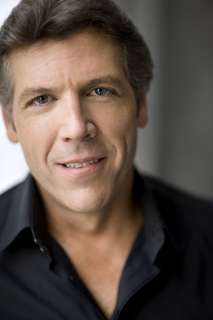|
Back
Triumphs out of Tragedies New York
Avery Fisher Hall, Lincoln Center
01/14/2010 - & Jan. 15, 16, 2010
Franz Josef Haydn: Symphony No. 49 in F minor (“La Passione”)
John Adams: The Wound Dresser (from a poem by Walt Whitman)
Franz Schubert; Symphony in B minor (“Unfinished”)
Alban Berg: Three Orchestral Pieces, Opus 6
Thomas Hampson (Artist-in-Residence/Baritone)
New York Philharmonic, Alan Gilbert (Musical Director and Conductor)

T. Hampson (© Dario Acosta)
In a short preface, conductor Alan Gilbert dedicated last night’s concert to the cataclysm of Haiti. Whatever the material effect on the people of that eternally doomed half-island, he could have literally dedicated each of the four works to tragedy’s terrifying faces.
Haydn’s “Passion” depicted the Crucifixion, John Adams’ Wound Dresser was to the victims of war. Schubert’s “Unfinished”, and Berg’s Three Orchestral Pieces were musically tragic, and unconscious requiems to the absurdity of mortality. Both composers died at an early age, Berg from the bite of an insect.
Still, these four encompassed a musical triumph for both the Phil and Maestro Gilbert. And the final work, Berg’s Three Orchestral Pieces, showed an orchestra and a conductor offering a performance of lustrous proportions. Berg’s tiny output of orchestral performances rarely includes this short triptych, but I can think of no work which shows off the composer’s masterful orchestral color. Yes, the piece does feel like an extension of Mahler’s Ninth Symphony, as is well known. But just by exaggerating the lines, by putting an atonal row into waltzes, marches and grand Mahlerian climaxes, we can feel that historical link to the 19th Century.
Mr. Gilbert, who frequently explains “difficult” music before conducting it, had no need for this here. (Especially since 50 or 60 people, who have the curiosity and intelligence of earthworms, noisily left the auditorium before the Berg.) More important was that the orchestra played with such shining textures–from the misty percussion at the opening to the tremendous climax in the third section– that one didn’t need to be aware of the technical complexity behind it.
Mr. Gilbert conducted in extremis. The cataclysmic syncopated tympani strokes–labelled fff, “played with both hands” in my score–were louder than the same notes in Berg’s later Lulu. The waltz in the second movement was like the eerie waltz in Wozzeck. And the entire work simply exploded throughout Avery Fisher Hall, with an emotional impact I had not suspected this season.
The opening Haydn symphony gives the lie to “jolly Papa Haydn”. Every movement is intense, noble, the appropriate 18th Century picture of the Easter Passion. The first movement was given that stately nobility by Mr. Gilbert. The second and fourth lacked that sense of doom, but ironically, it was the minuet, with its strange echoes, giving an inkling of the religious unity.
The challenge for Schubert’s “Unfinished” is to listen with fresh ears. This concert made it simple, since it fit in so perfectly with the other works. Mr. Gilbert, too, gave it the grandeur it deserved. The brass accompaniment in the second movement was played so wonderfully that I pictured this as the major theme of an imaginary final movement.
Finally, a work for which I could dedicate reams: John Adams’ Wound Dresser, taken from a much larger poem by Walt Whitman. Like his Transmigration of Souls for the bombing of the World Trade Centre, this was about death in war. Not about its nobility but its awfulness, its uselessness, its scariness, its absurdity.
For each of the truncated verses–well edited by Mr. Adams for the music–the music changed. The music of dawn for the opening (one could see Whitman, sauntering down the Washington streets, resolute, sad, abrupt), then trumpet anthems, a kind of perverse reveille (played with stentorian glory by Philip Smith) until the sad end, the “soldier’s kiss… on these bearded lips.”
The work can only be sung by a baritone, and now I only want to hear it from baritone Thomas Hampson. His is such a clear sensitive, intelligent voice, holding back the emotion until it is really needed, that I, for one, (and certainly most others) had to have been enthralled.
I presume that was so, but during the intermission, the audience stood on line, and drank their drinks as if they had been listening to a nursery rhyme. As for myself, I had to dash down the steps, rush outside, and–to quote another poem by Walt Whitman– hopelessly tried to lose myself in “the teeming spiritual darkness.”
CODA: Mr. Hampson will be speaking and singing tonight (Friday, January 15) in a free performance opposite Lincoln Centre in the Barnes and Noble Bookshop. He begins at 7.30, but get there early for good seats.
Harry Rolnick
|